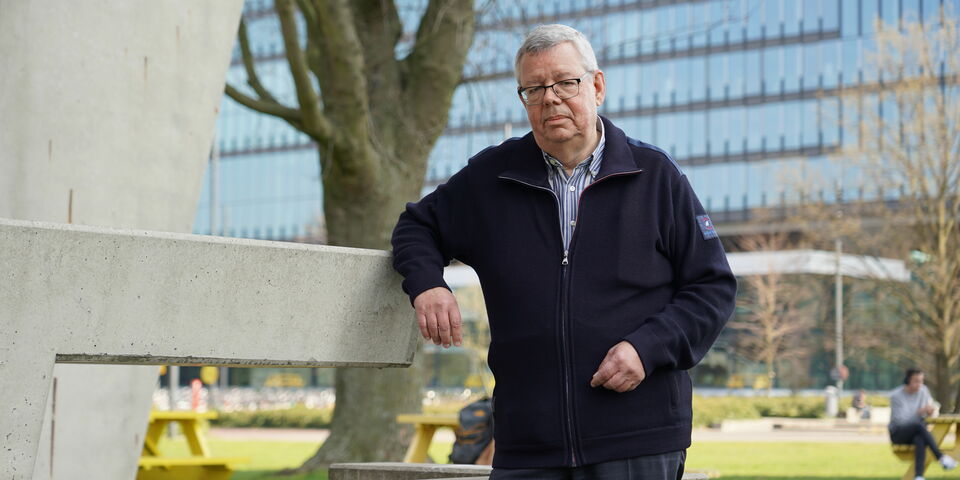Working to keep policy matters on the right track
Ben Donders started his career at TU/e in 1988 as head of the Executive Board’s secretariat, after which he fulfilled several supporting activities for that same board as well as for many project groups and committees. Out of the community’s view, he ploughed his way through various stacks of dossiers and documents for 34 years. The designer’s programs were of special interest to him during the past 20 years. His bids farewell to the university on April 1.
No, TU/e wasn’t his first employer, Ben Donders says, but he did continue to work there for a long time. “Why? Because TU/e is quite a large organization that changes constantly, and there was always something new for me to work on during all those years.” During the early nineties, when he acted as registrar, Donders was responsible for the preparations for the Executive Board meetings on Thursday morning, as well as for the board’s monthly meetings with the University Council.
“I was actually present during the Executive Board meetings, and I documented the decisions that were made.” That changed when Henk de Wilt was appointed board president in 1996, Donders says. “He wanted significantly fewer people in the room during those meetings. He clearly was a different kind of administrator than his predecessor Henk ter Heege. He was more inclined to directly approach people within the organization himself with his plans and intentions.” Donders was subsequently tasked with the implementation of the MUB, which stands for Modernization University Board organization. During a large-scale reorganization in 2001, which will probably sound familiar only to senior employees – the so-called AVA operation – Donders acted as internal project leader.
In 2002, when TU/e intensified its collaboration with Delft and subsequently with Twente, which eventually resulted in the launch of the 3TU.Federation (of which Wageningen is a part as well these days), Donders assisted then rector Rutger van Santen and board president Amandus Lundqvist. In short, Donders witnessed a wide variety of changes and innovations during all his years at TU/e.
Stan Ackermans Institute
Donders first became involved with the designer’s programs and the Stan Ackermans Institute (SAI) as earlyas 2001. In his capacity as managing director, he was tasked with ‘virtualizing’ the SAI within a short timeframe, which meant that he had to transfer the SAI’s activities to the departments and services in order to reduce the institute’s costs. He remained involved with the SAI ever since. Since 2014, Donders has been assisting the dean of the Graduate School – first Jan Fransoo and currently Paul Koenraad – in both general and financial matters, as well as in matters related to the PDEng programs, short for Professional Doctorate in Engineering.
Donders acknowledges that the designer’s programs are a difficult topic. “We had to, and sometimes still have to, convince departments to take part, and students too sometimes need some explanation about what it entails exactly. It’s a two-year trajectory, during which students spend the first year in the lecture hall and the second year working on a company assignment. That differs rather significantly from a four-year doctoral period. Kees van Hee, former director of the SAI, used to refer to it as TU/e’s ultimate innovation tool for companies, because it allows companies to gain access to the most up to date knowledge in a certain field via recently graduated students.”
Considering the number of PhD students who start with their doctoral period at TU/e every year, the SAI is significantly smaller, Donders says. “Most of the PDEng graduates come from our university. There are more than 3000 of them now, over a 35-year period. Delft and Twente produced significantly fewer PDEng graduates; 800 and 600 respectively. But Wageningen has launched a PDEng program now as well, and Groningen might also launch one.”
Waves
The thing that Donders noticed during all those years as policy officer, is that things always seem to occur in waves. “I sometimes look at it with amazement; a topic that has been forgotten about for a long time suddenly becomes topical again, as if it’s an entirely new idea.”
He saw how policy processes became increasingly complicated during all those years. Donders believes that university administrators, like politicians, are more and more required to quickly formulate answers to all kinds of developments in society. He also sees that complexity increase within the university, “as a result of the presence of more parties, consultative bodies, such as the emergence of various committees within the university council. And the same applies to the field of education; more and more groups have a say in matters of policy and developments for the future.” He observes it, but doesn’t express any kind of judgement.
Apart from his work at TU/e, Donders was politically active within the PvdA for many years, the party for which he sat on Eindhoven’s municipal council. He was also active as board member of several wellbeing and educational organizations. After April 1, he has time to figure out whether he wants to continue with these activities.


Discussion